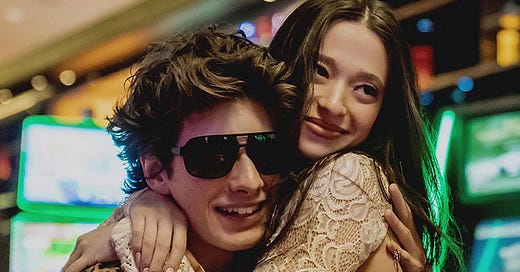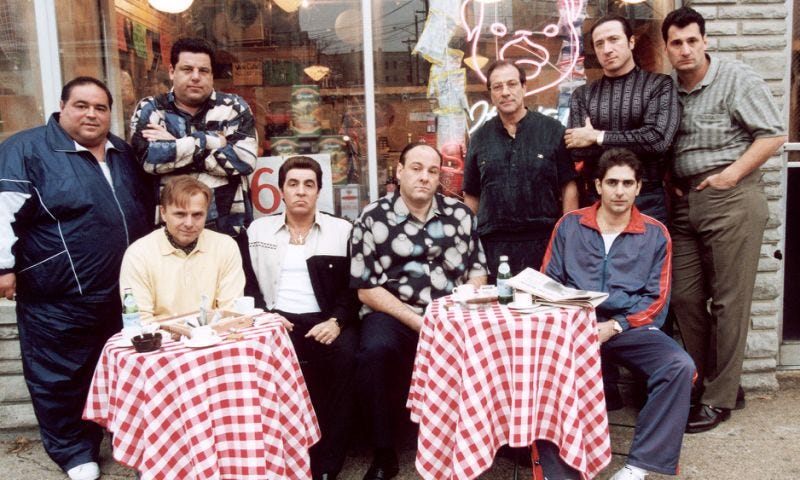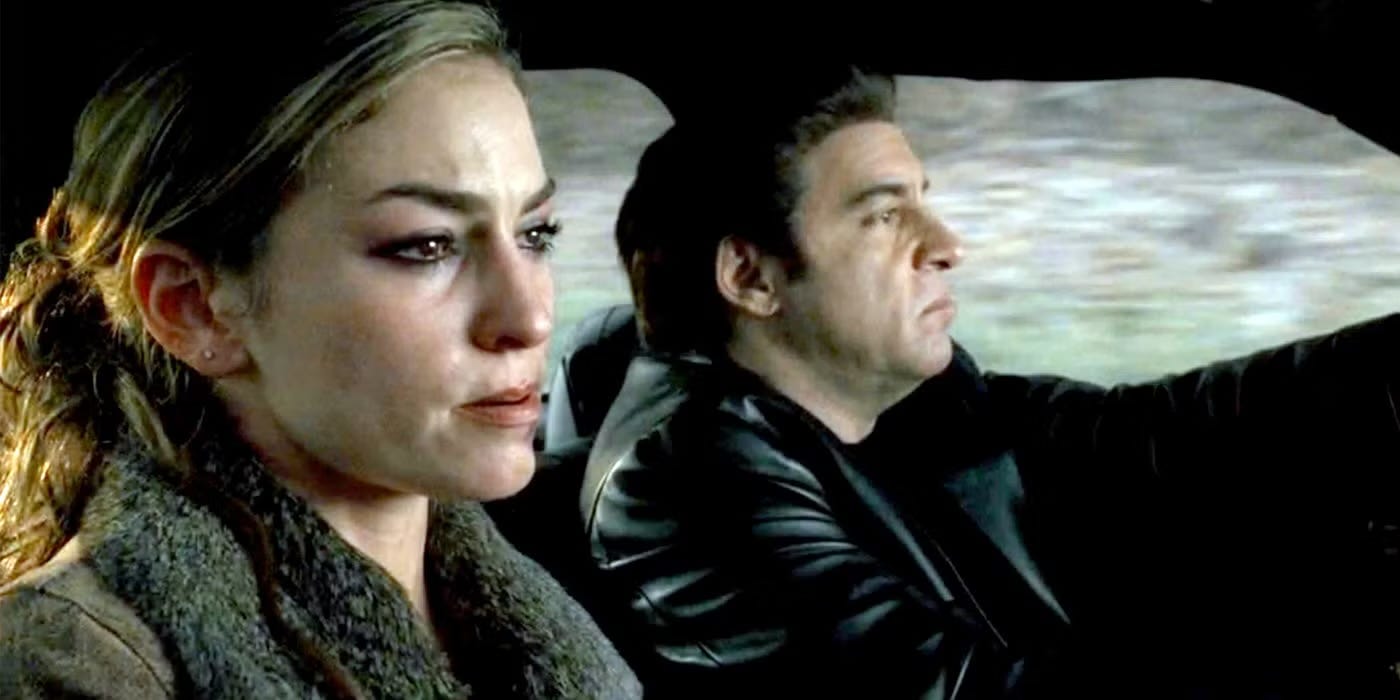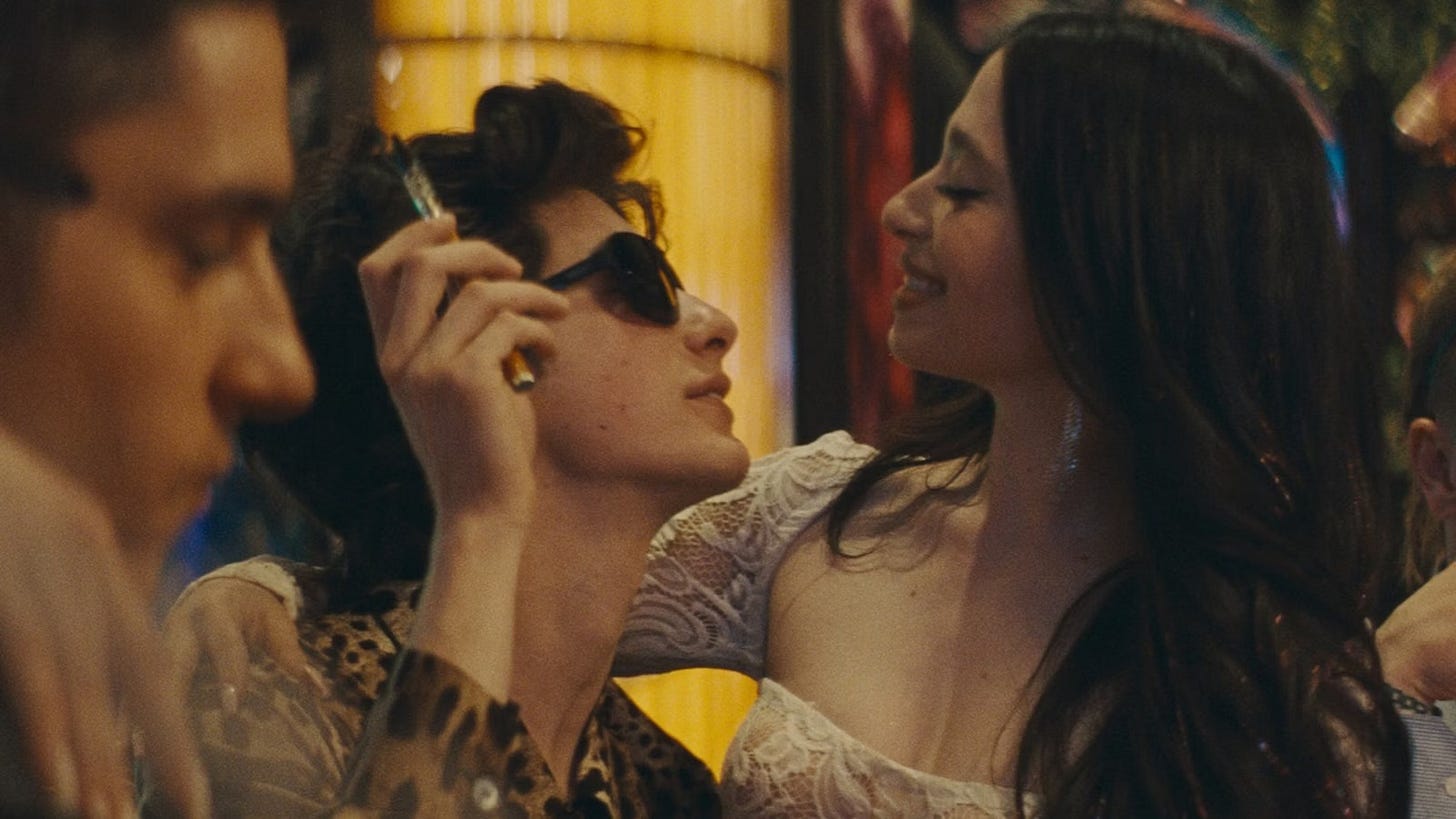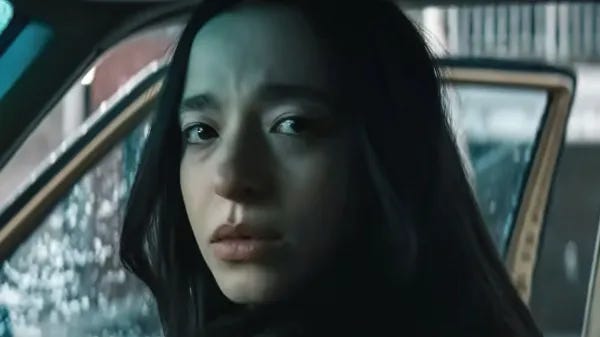Anora, The Sopranos and The Illusion of Safety
A movie about Russians and sex work, but no guns? Whaaaat in the Bada Bing!
Alert: This newsletter contains spoilers for the movie Anora. And if you don’t want to read a big spoiler for The Sopranos, skip paragraph 9.
In a scene towards the end of Anora, our titular character, a Brighton Beach sex worker swept into a bombastic love affair with the son of a Russian oligarch, is smoking a cigarette on the floor of a sprawling Marine Park mansion. She’s accompanied only by Igor, the henchman who has been assisting in holding her captive for the last 24 hours, forcing her to annul a marriage that would have Cinderella-style lifted her out of the working class. The two have been at odds throughout the entire film, except they haven’t really. The audience knows from the very beginning that Igor, a hardened-yet-sensitive Russian, feels for the spunky 23-year-old, who is trying with all her might to preserve a love story thinner than the Trojans her bratty beau Ivan “Vanya” Zakharov1 litters on the floor of his parents’ bedroom.
It’s clear that Igor is both sympathetic to Anora, who goes by “Ani”, and wildly impressed by the tenacity with which she attempts to defend what she feels is rightfully hers — a six carat diamond ring and a future where the only labor she is forced to exert is the emotional kind2. From Ani’s perspective, Igor is a dangerous criminal who kidnapped her. But as he passes her a lit cigarette, she struggles to keep up the ruse that he is really the villain in her story. He assaulted her, she reminds him, and given the right circumstances, he could have raped her, even. Igor laughs at this notion since to him, and to us as the viewers, it seems patently absurd.
“But you know you were never in any real danger,” he asserts. And half the fun of Anora is that he’s right.
While the film’s writer and director Sean Baker sets out to tell a weighty story about class mobility, the stakes feel surprisingly low. I have to admit the Tom-and-Jerry-level violence feels eerily amiss: A movie about Russians and sex workers and there are no guns??
Anora exists within a bubble of safety I kept expecting to burst. Days after leaving the theater, I’m still fascinated by the way it didn’t. And I wonder if that bubble might be the reason the movie is so resonant in this particular moment. I can see how a film that deals primarily with power, agency and the lack thereof, but isolates itself from an immediate threat of violence, would appeal as our world continues to descend into chaos.
The film depicts Ani’s fear and fighting instincts as cartoonishly out of proportion, in part because Anora never presents Ani’s situation as being inherently dangerous. The only true injury she sustains results from a cat fight between her and another exotic dancer. And any sense of menace emanating from the film’s three bumbling henchmen — Igor and “The Armenians” Toros and Garnick, who were hired to keep Vanya in check and are now tasked with resolving the problem of their marriage — is immediately kneecapped by the ferocity of Ani herself. She kicks Garnick in the face and takes a bite into Igor’s neck while the two goons try to keep her inside the Zakharov mansion long enough for Toros to arrive. Together, the odd foursome shift the film into a comedy of errors, and delightfully so as they go on a wild goose chase through Coney Island looking for Vanya.
But writer/director Baker’s distinctively male POV clearly takes for granted that a bunch of stocky South Brooklyn-ers would be harmless and not terrifying. Yes, Baker shows us right away that these guys are lovable doofuses tasked with an annoying babysitting job. But if I’ve learned anything from watching shows like The Sopranos, it’s that being a lovable doofus does not preclude you from being a murderer.
Maybe I’m wrong for thinking about Anora within the context of The Sopranos. The worlds aren’t necessarily the same and perhaps its reductionary to wrap sex work in with organized crime (though “The Armenians” certainly seem mob-coded). But I keep coming back to the HBO staple, I think because it thrived on presenting that illusion of safety and then shattering it.
The show, which premiered in 1999, follows the last dregs of a crime family shepherded by mob boss Tony Soprano, who in contrast to his work persona, also goes to therapy and feeds ducks. Across seven seasons, the series carves out a world of goofy old Italian guys who watch Who Wants to be a Millionaire, play poker and talk about the news, all the while showing us a forest of bodies buried in their wake.
There were plenty of Anoras in The Sopranos and many of them died. Watching Ani looking anxious in the passenger seat of an SUV, I couldn’t help but think about the tragic fate of Adriana La Cerva, Tony’s nephew’s Christopher Moltisanti’s fiancée and a character in The Sopranos beloved by all. She and Ani are similar in a lot of ways. They have a level of ingenuity mixed with amiable charm that makes them hard to resist. And this is the protective layer that seems to keep Ani from ever being in real danger in Anora. While it’s clear that Ani doesn’t wield any power with the family of Russian oligarchs, she does have an effect on the henchmen they’ve hired to keep her in check. Their affection doesn’t give her what she wants (a proper divorce, at minimum) but it allows her some wiggle room. In the end, the same can’t be said for Adriana. Those lovable doofuses were not harmless. They loved her and they killed her.
But should it really be so different for Anora? Walking out of the theater, I turned to my friends and said “They definitely could’ve killed her, right?” While the movie doesn’t tell you who Vanya’s parents are outright, or spell out any of the mob ties, it’s easy to see how this situation would have been genuinely life threatening. Even the fact that Ani’s established as having hardly any family in town should show how disposable she is, and how vulnerable. When Garnick and Igor enter the house and Vanya takes off, leaving Ani defenseless, her fear is real and justified, but it comes off as a comical overreaction.
To Baker’s credit, if the audience shared in Ani’s fear and anxiety, it could undermine Anora’s commentary on class solidarity. While the film is not so much concerned with safety, the illusion of agency and power are central, particularly in the context of sex work.
In entering Vanya’s ultra-rich world, Ani is dazzled by the seemingly endless well of opportunities, but at the same time, she never forgets that her life, in its essence, is transactional. Vanya pays her $15k to be his girlfriend for a week, and then he marries her so he can stay in America and she can continue to live a life of extravagance. While she feels a genuine affection for him (for reasons that are largely unclear), the real romance she clings to is her own power, her ability to secure a different kind of life through a romantic bargain. More than just her sexuality, Ani puts stock in her inherent value as a partner, as a wife.
This of course comes crashing down when Vanya’s parents catch word that he has married an escort and he immediately abandons and eventually renounces her, revealing that, all along, she was a plaything who could hold no real power over him. The effect is devastating, not because Ani was really so in love with Vanya, but because she had deluded herself into thinking that she wasn’t just a product in this transaction, but a player.
In the final scene, Ani again tries and fails to assert some kind of power and agency through sex, this time in her relationship to Igor. She’s thwarted, not by Igor’s indifference to her, but by his care for her. She breaks down as he tries to kiss her because in having to accept his kindness and affection, she must also acknowledge that it is beyond her scope of influence. She feels the futility of her labor (sex) in moving either of these men. And there’s a powerlessness, a uselessness that is palpable.
But the real fairytale of Anora isn’t the Cinderella story of upward mobility but one of unity. Snow White and her Gopniks. Ani and the henchmen are on the same level, all sucking from the teet of a family that could cut them off at any moment. It’s a tense environment that puts people who should be on the same side diametrically at odds. But while Ani and the goons don’t entirely band together to take down the oligarchs, they are at least silently on each other’s sides by the end, and perhaps in that final scene, Igor is helping Ani untangle herself from the delusion of the American dream. There’s a catharsis in Ani’s tears as she is forced to accept that her relatively easy ascent into wealth was a fantasy and she is not the sole arbiter of her socioeconomic fate, a revelation most growing up in America arrive at inevitably. Hopefully, what comes next (for Ani and Igor, and for all of us) is an understanding that all we have is each other.
I see how it might be challenging to punctuate that takeaway with a Sopranos- level of violence. Although it’s ironically called a crime family, Tony exists in a zero-sum world, where solidarity is strictly contractual. The show’s psychological egoism doesn’t track with Igor’s theft of the diamond ring, and so maybe its brutalism doesn’t either.
I still wonder though, when placed against reality, if Anora’s conceit is naive. Is it a plot device that Vanya’s men wouldn’t be more physically brutal, or moreso that Vanya’s rich and powerful parents wouldn’t have put a greater threat on Ani’s life? Or is this actually the more realistic, and less flashy version of events? Is Sean Baker casting an illusion of safety in order to tell a specific story or is the commonplace violence on a show like The Sopranos actually heightening our fear in service of entertainment? Maybe in leaving the guns out of it, Baker can better emphasize a more ubiquitous kind of violence, where watching Ani be pinned down and gagged by a 250-pound Russian man is actually far less terrifying than watching her confront Vanya’s mother, Gallina, who reminds Ani that with a snap of her fingers, everything she has could be taken. Why bother threatening to kill her when they both know there are things worse than death?
But I have this nagging feeling that my perception is warped by my own denial, and fear. The truth is the Sopranos’ visceral brutality and Anora’s softer, socioeconomic violence are always coexisting. We silo them from one another because those of us who are experiencing only the latter don’t want to even think about experiencing the former, and those who are experiencing the former are beyond caring about the latter. Maybe Anora is so relevant because it tip-toes between these two planes of violence in a time when the line separating them feels like it’s growing thinner. The fact that Anora never fully crosses over could feel like a hollow relief — or a blessing.
In some ways, Anora fills the gaps where violence would go instead with humanity. Igor’s act of kindness feels like it was prompted by a tipping point. He accepts his own futility in a warped system, just as Ani is starting to, and it leads him to break the rules he knows aren’t serving him. It’s his decision to break them for someone else that offers a kind of hope in the human race The Sopranos would never concede to. Then again, The Sopranos is built upon characters lying to themselves — about who they are, about their place in the world and how to keep it. Anora ends on a note of honesty, a moment of post-fever clarity. And maybe I’m projecting my own longing for something better, but it seems like somewhere in that clarity is a path forward.
who looks like if Jack Schlossberg and Timmy Chalamet had a baby
Being sandwiched in between Vanya’s chest and the video game controller he is aggressively wielding should come w its own pension fund tbh

